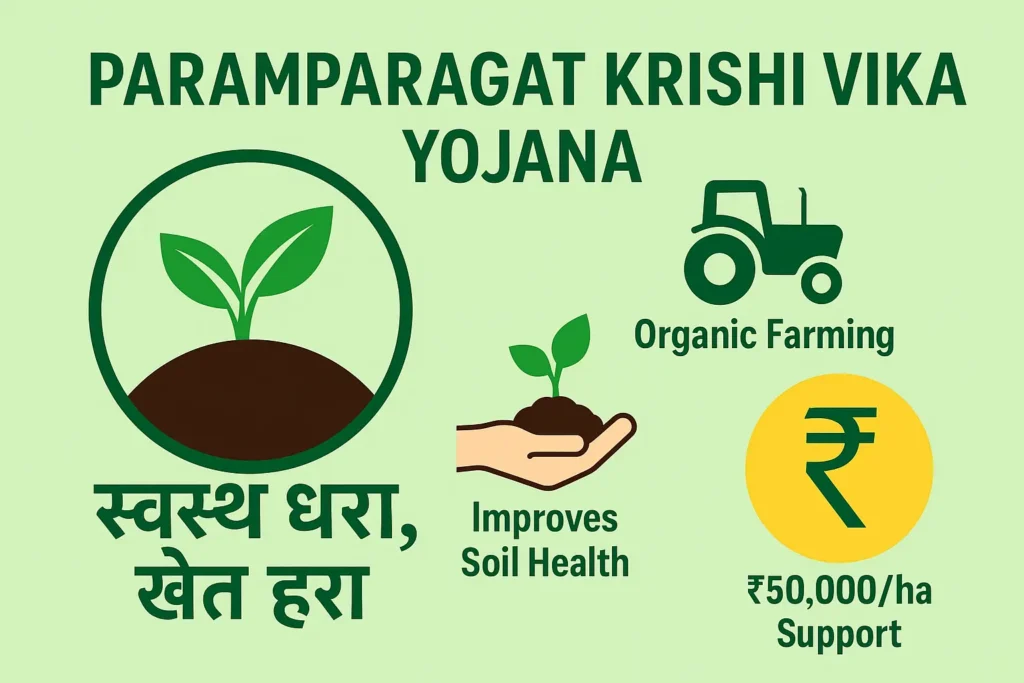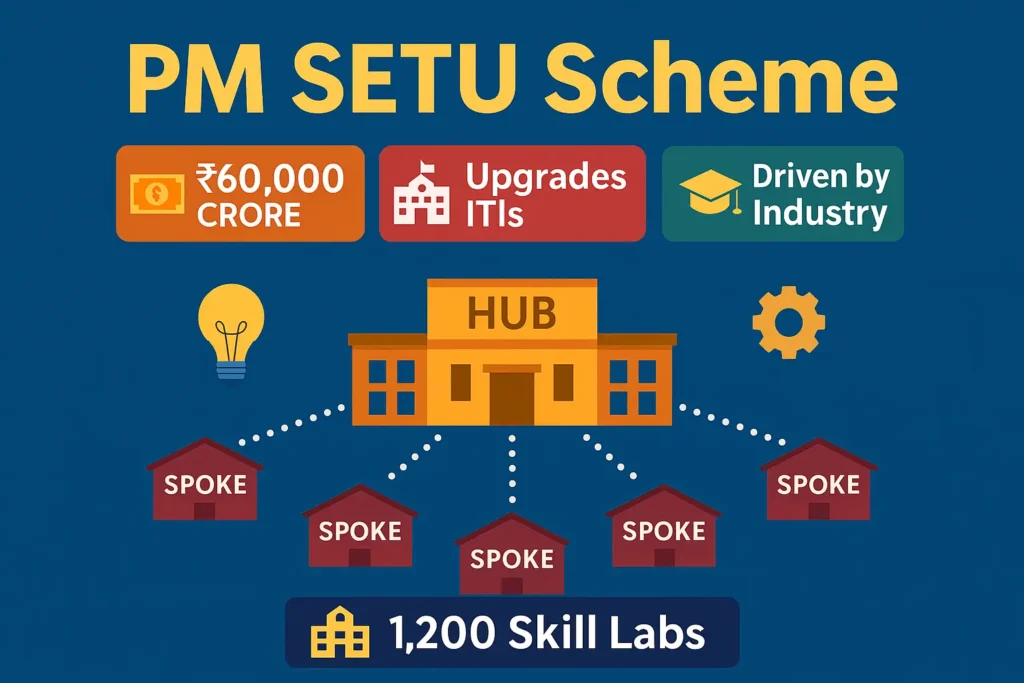Paramparagat Krishi Vikas Yojana
Table of Contents
The Paramparagat Krishi Vikas Yojana (PKVY) is one of India’s most important organic farming schemes launched to promote traditional and sustainable agricultural practices. It aims to reduce the use of chemical fertilizers and pesticides, improve soil health, and increase farmers’ income through organic and eco-friendly farming methods.
This article explains the objectives, features, implementation, and benefits of PKVY in simple language — useful for UPSC, APPSC, SSC, and other government exams.
Launch Year and Ministry
- Launched: 2015–16
- By: Ministry of Agriculture and Farmers Welfare
- Implemented Under: National Mission for Sustainable Agriculture (NMSA)
- Nodal Division: Organic Farming Division
Objective of Paramparagat Krishi Vikas Yojana
The main aim of the Paramparagat Krishi Vikas Yojana is to promote organic farming through cluster-based approaches and Participatory Guarantee System (PGS) certification.
Key Objectives:
- Promote eco-friendly and chemical-free farming.
- Reduce dependency on chemical fertilizers and pesticides.
- Improve soil fertility and biodiversity.
- Enhance farmers’ income through value-added organic produce.
- Build market linkages between farmers and organic consumers.
- Strengthen rural employment and sustainable livelihoods.
How PKVY Works
Under this scheme, groups of farmers (clusters) are encouraged to take up organic farming collectively in a given area.
Key Features:
- Cluster Approach: Each cluster consists of 50 or more farmers covering 50 hectares of land.
- Financial Assistance: ₹50,000 per hectare provided for a 3-year period, which includes:
- Organic inputs (seeds, bio-fertilizers, compost, neem cake, etc.)
- Training and certification
- Value addition and marketing support
- Participatory Guarantee System (PGS):
Certification system based on peer review, ensuring that the produce is organic and chemical-free. - Training Support: Farmers receive hands-on training in composting, pest control, soil management, and organic certification.
Benefits of Paramparagat Krishi Vikas Yojana
| Benefit | Description |
|---|---|
| Soil Health | Promotes natural nutrients and microbial activity in the soil. |
| Water Conservation | Reduces chemical runoff and groundwater pollution. |
| Farmer Income | Organic produce fetches better prices in national & export markets. |
| Eco-friendly Farming | Restores traditional Indian farming methods (paramparagat = traditional). |
| Employment Generation | Promotes rural entrepreneurship through organic food processing and marketing. |
Implementation & Achievements
- Over 10 lakh hectares of land brought under organic farming through PKVY and related programs.
- Over 30 lakh farmers trained in organic farming methods.
- States like Madhya Pradesh, Rajasthan, Uttarakhand, and Sikkim have taken the lead in implementing PKVY.
- Sikkim became India’s first fully organic state in 2016.
Logo and Tagline
- The Paramparagat Krishi Vikas Yojana logo features green leaves and soil, symbolizing organic growth and sustainability.
- The tagline promotes “Swasth Dhara, Khet Hara” (Healthy Earth, Green Farm) — emphasizing soil health and sustainable agriculture.
Difference Between PKVY and Other Schemes
| Scheme | Focus Area | Implementing Ministry |
|---|---|---|
| PKVY | Organic farming through cluster-based approach | Ministry of Agriculture |
| Soil Health Card Scheme | Soil testing and nutrient management | Ministry of Agriculture |
| Rashtriya Krishi Vikas Yojana (RKVY) | Holistic agricultural development | Ministry of Agriculture |
| National Mission for Sustainable Agriculture (NMSA) | Climate-resilient farming | Ministry of Agriculture |
Why PKVY is Important for India
- India ranks first in number of organic farmers and fifth in area under organic cultivation globally.
- Organic farming not only ensures food safety but also reduces environmental pollution.
- PKVY plays a key role in achieving SDG 12 (Responsible Consumption & Production) and SDG 15 (Life on Land).
Exam-Oriented Facts Summary
| Topic | Data |
|---|---|
| Scheme Name | Paramparagat Krishi Vikas Yojana (PKVY) |
| Launch Year | 2015–16 |
| Ministry | Ministry of Agriculture & Farmers Welfare |
| Implementing Division | Organic Farming Division under NMSA |
| Main Objective | Promotion of organic and traditional farming |
| Financial Assistance | ₹50,000 per hectare for 3 years |
| Cluster Size | 50 farmers covering 50 hectares |
| Certification System | Participatory Guarantee System (PGS) |
| Tagline | “Swasth Dhara, Khet Hara” |
| Important for | UPSC, APPSC, SSC, State PSC exams |
FAQs on Paramparagat Krishi Vikas Yojana
-
What is the Paramparagat Krishi Vikas Yojana (PKVY)?
It is a Central Government scheme to promote organic farming using traditional methods and reduce chemical dependency.
-
When was the Paramparagat Krishi Vikas Yojana launched?
It was launched in 2015–16 by the Ministry of Agriculture and Farmers Welfare.
-
What is the main objective of PKVY scheme?
To promote eco-friendly farming, improve soil health, and increase farmers’ income through organic cultivation.
-
How much financial assistance is given under PKVY?
₹50,000 per hectare for 3 years for organic inputs, certification, and marketing.
-
What is PGS in PKVY?
Participatory Guarantee System (PGS) is a farmer-group-based certification that ensures organic quality through peer verification.
-
Which states have implemented PKVY successfully?
Madhya Pradesh, Rajasthan, Uttarakhand, and Sikkim are leading states in PKVY implementation.
The Paramparagat Krishi Vikas Yojana reflects India’s vision of reviving traditional agriculture, protecting the environment, and empowering farmers through organic methods. By combining ancient wisdom with modern techniques, PKVY helps build a sustainable, profitable, and healthy farming ecosystem — a crucial step towards Viksit Bharat @2047.
Source: PIB


